Anyone can take pictures.
A primate (sic) example is the macaque from North Sulawesi who stole David Slater's camera and took a series of selfies (apparently hundreds).
Anyone can take pictures.
A primate (sic) example is the macaque from North Sulawesi who stole David Slater's camera and took a series of selfies (apparently hundreds).
"Each year, thousands of long tailed macaques are bred and captured from the wild for sale in Jakarta where they face a life of exploitation and cruelty. There are three main fates awaiting macaques: the pet market (including “Topeng Monyet”), research (export) and food (Indonesian based Chinese restaurants).
Over recent years JAAN has actively campaigned and lobbied to end the exploitation of macaques in Indonesia, in particular those macaques used for the cruel “Topeng Monyet” trade.
Young macaques are caught from the forests by poachers and sold (the price straight from the trapper is Rp 25.000 or US$2). In Jakarta, for Rp. 70,000 (US$7) a young macaque can be purchased. Macaques are sold in pet shops, bird markets and in front of shopping malls by street vendors. The baby macaques attract people because they look cute and are cheap to purchase.
The macaques can be seen kept on short chains, on the street and often in front of the owner’s house. While growing up to adulthood, the chain often grows into the skin, leading to horrific infections and tetanus. Macaques are highly social creatures and in need of social contact. Macaques also form potential health hazards in urban areas due to the likeliness of disease transfer.
...
Recently Governor Jokowi agreed with the need to stop this practice.
The new regulation formed by Governor Jokowi was implemented in October 2013 and is a very big step towards primate protection and general animal welfare in Indonesia and will end the cruelty now inflicted on thousands of monkeys captured from the wild to be exploited on Jakarta’s busy streets."
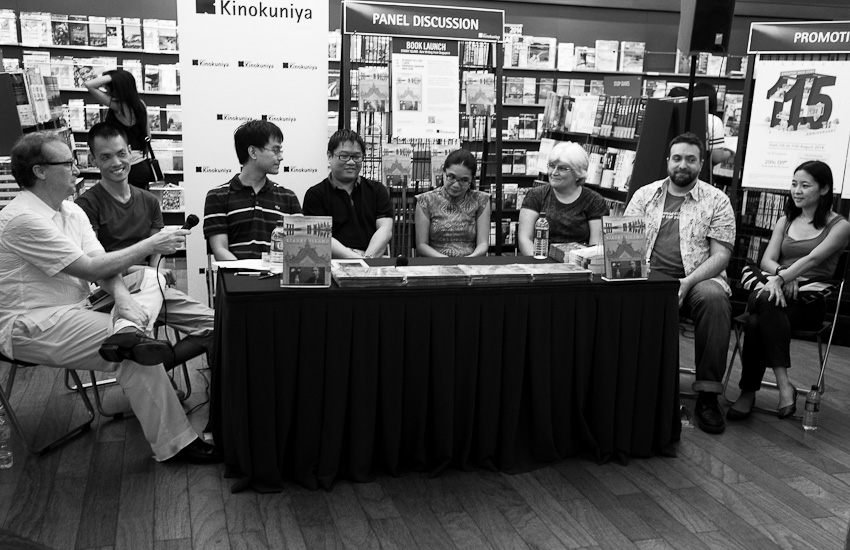
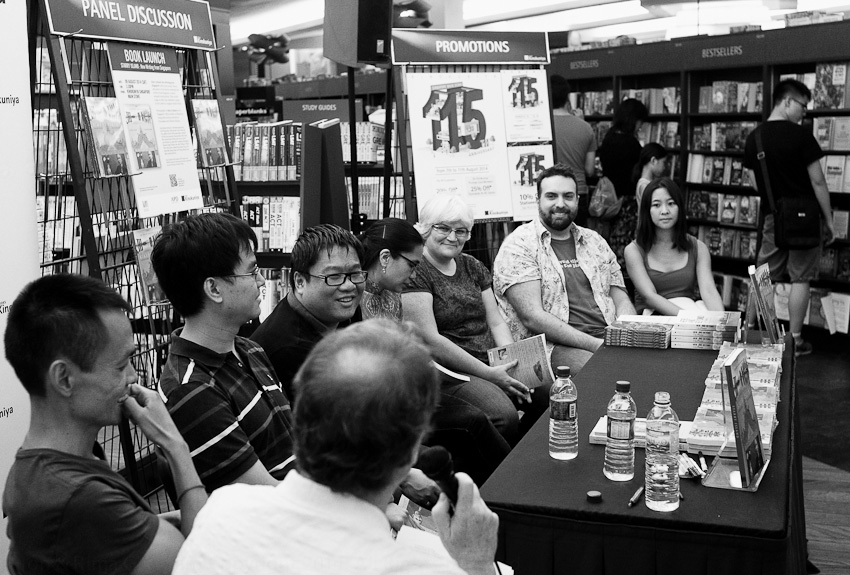
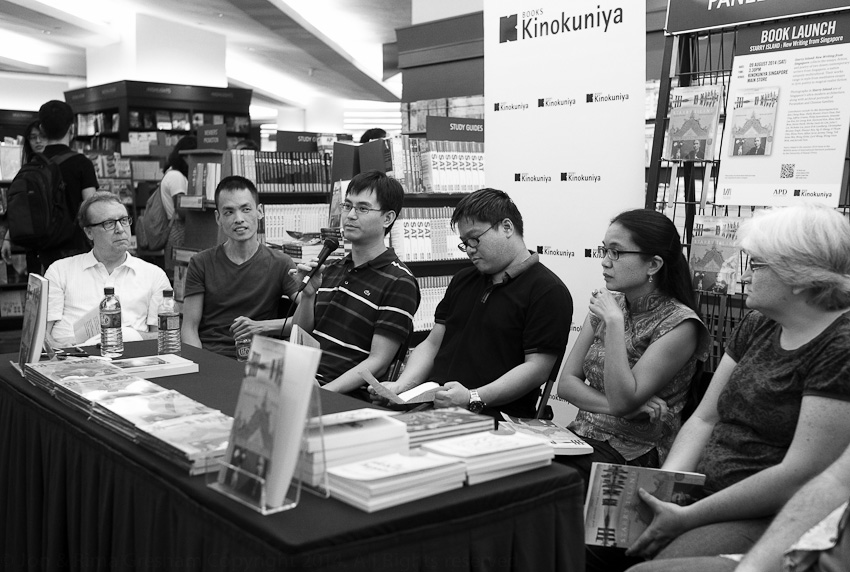
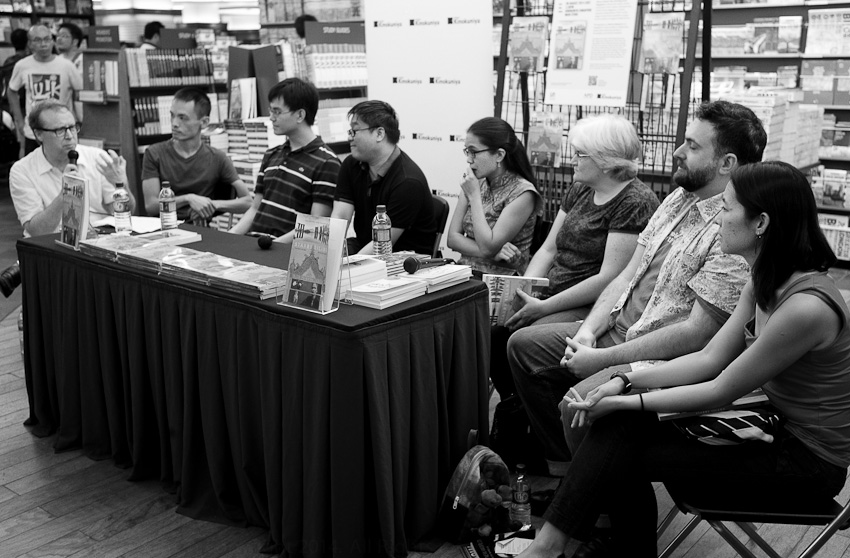
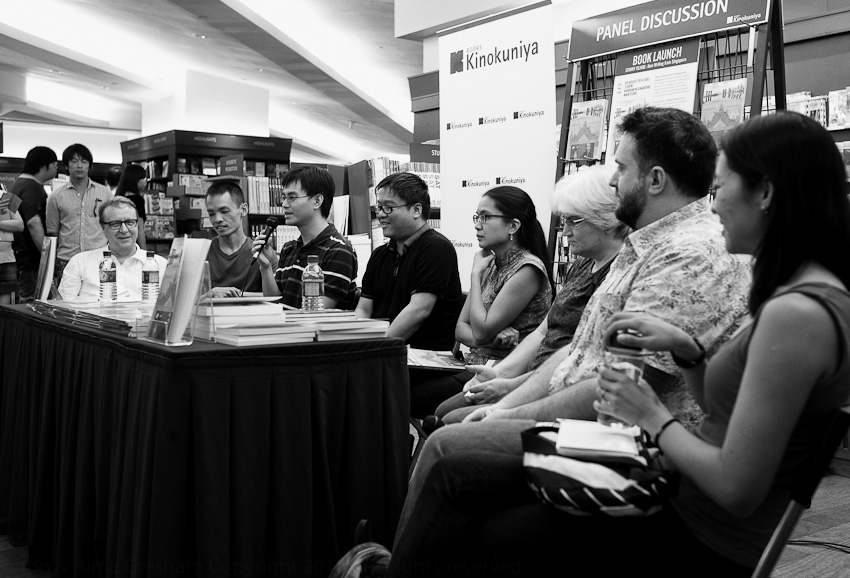
"Starry Island: New Writing from Singapore" was launched at Kinokuniya on 9 August 2014.
Appearing on the panel were contributors Cyril Wong, Nicholas Liu, Desmond Kon, Yu-Mei Balasingamchow, Shelly Bryant, Jason Erik Lundberg and Grace Chua - with Peter Schoppert.
Guest edited by Fiona Sze-Lorrain. Other contributors include Kim Cheng Boey, Dan Ying, Jeffrey Greene, Philip Jeyaretnam, Amanda Lee Koe, Jee Leong Koh, Khoo Seok Wan, Karen Kwek, Shirley Geok-lin Lim, Julia C. Lin, Christopher Mooney-Singh, Eleanor Neo, Ng Yi-Sheng, O Thiam Chin, Wena Poon, Alfian Sa’at, Jeremy Tiang, Toh Hsien Min, Wang Xinlei, Wong Yoon Wah, and Jerrold Yam.
Published by MANOA, the literary journal of the University of Hawai‘i Press.
Copies available at Kinokuniya and (probably) Books Actually.
I've just returned from Jakarta for Mudik, where I spent Hari Raya with the family. It's a lot like Chinese New Year and Christmas with many visits from and to relatives and friends. Children are given packets of money and you ask forgiveness of one another for your physical and emotional wrongdoings.
I've also just finished Elisabeth Pisani's wonderful, must read book, Indonesia Etc. I am always amazed how little Australians know about Indonesia, reading this book is an ideal starting point.
Pankaj Mishra has a thoughtful, optimistic review in the New Yorker.
"The Indonesian archipelago is unlikely to descend into the violent secessionist anarchy currently on display in the Middle East and North Africa. However, what it still needs, as Geertz once argued, is a “structure of difference within which cultural tensions that are not about to go away, or even to moderate, can be placed and negotiated—contained in a country.” Such a reconfigured national consensus, or a way of doing without one, seems equally imperative in the case of Hispanic immigrants in America, Muslims in France, Palestinians in Israel, Tamils in Sri Lanka, Kurds in Turkey, and Tibetans in China. The old question—what is a country, and what is its basis?—has become menacingly relevant long after it appeared to have been settled. In that sense, it is not facile to wonder if we are all Indonesians now, facing the perplexities of a shattering old order."
The More Loving One
Looking up at the stars, I know quite well
That, for all they care, I can go to hell,
But on earth indifference is the least
We have to dread from man or beast.
How should we like it were stars to burn
With a passion for us we could not return?
If equal affection cannot be,
Let the more loving one be me.
Admirer as I think I am
Of stars that do not give a damn,
I cannot, now I see them, say
I missed one terribly all day.
Were all stars to disappear or die,
I should learn to look at an empty sky
And feel its total dark sublime,
Though this might take me a little time.
W H Auden
Jokowi has won.
It's official I read it in the New York Times:
"Mr. Joko will lead a country that has successfully consolidated its democracy and enjoyed strong economic growth under the departing president, Susilo Bambang Yudhoyono, who has served two five-year terms. Indonesia has had one of the fastest-growing economies in Asia in recent years, along with China and India. But that same economy, which achieved annual growth rates of more than 6 percent from 2010 to 2012, mostly thanks to the country’s abundant natural resources and robust domestic consumption, is facing several serious challenges.
They include a trade deficit, a national fuel subsidy that sucks tens of billions of dollars each year from the state budget, inadequate infrastructure, corruption, poverty and a growing disparity between the country’s rich and poor."
Alison Martin comments in the Guardian on what a Jokowi Presidency means for the Indonesian Australian relationship:
"Indonesia went as far as to directly request Australia not take unilateral action on that issue, saying Jakarta's "close cooperation and trust" was at risk. Australia, true to form, forged ahead with its "turn back the boats" policy, later prompting Indonesia to deploy warships to monitor its southern border. It is relatively rare for an issue relating to Australia to make front-page Indonesian news, yet these incidents have been regularly canvassed. The relationship is in the diplomatic doldrums, and improving slowly.
During last month’s foreign policy election debate in Indonesia, both candidates acknowledged the distrust between the two nations. Although each indicated they would seek to heal the rift with Australia, they also agreed that Indonesia should not allow itself to be belittled by its neighbour.
In light of Australia’s military intervention in East Timor just 15 years ago, and its role in Konfrontasi some decades prior, there is understandable anxiety when an Australian government brands its border protection programme, which impinges upon Indonesia's sovereignty, “Operation Sovereign Borders”. It's easy to comprehend why national security has been cited by Jokowi as a priority, suggesting further incursions will not be received lightly.
In contrast to SBY, Jokowi will not be so personally invested in the bilateral relationship. Australia will have to work much harder to collaborate with Indonesia."
Joko Widodo looks set to be formally declared the winner of Indonesia's Presidential elections today - although Subianto Prabowo is pushing for a delay to the announcement, its unlikely he'll succeed. However, he may then file a police report against the KPU and appeal to the Constitutional Court and there are concerns that riots may erupt when the result is announced today.
"President Susilo Bambang Yudhoyono has called for the losing candidate in the presidential race and his supporters to accept defeat graciously once the official announcement of the results is made on Tuesday, with Jakarta Governor Joko Widodo virtually certain to be declared the winner.
“Admitting defeat is noble, congratulating the winner is beautiful,” Yudhoyono said in Jakarta on Monday."